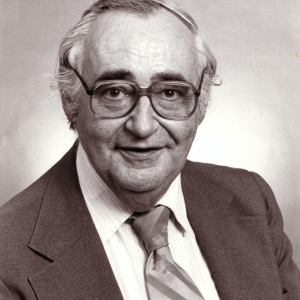An excellent introduction to the problems of the modern theonomic movement (as I call it, to distinguish from classical theonomy), the late Roger Nicole provides this discussion (listen below) at the Reformed Theological Seminary.
Nicole, who passed away in 2010, was a Swiss Reformed Theologian with a ThD from Gordon Divinity and a PhD from Harvard. Born in a German concentration camp, he spoke as many as eight languages, and had a truly brilliant mind. An editor for the New Geneva Study Bible and archivist of over 20 thousand Reformation-era publications, having personally penned over four dozen books and hundreds of articles, Nicole’s clout among the Reformed academic community cannot be over-stated. Brilliantly balancing both Reformed or Calvinistic and Baptist theology, Nicole was respected for treating the viewpoints of others fairly.
A note on Nicole’s noteworthy impartiality when presenting opposing viewpoints, Mark Dever writes:
Roger was especially fair to those whose views he did not share but opposed. He always presented both the strengths and weaknesses of each position he described, and put things carefully in perspective of the gospel. In fact, so well would he describe the strengths of the positions he did not hold that it may be that there is more than one noted paedo-baptist minister today who became paedo-baptist through the Baptist Roger Nicole’s lectures.
While professor at Reformed Theological Seminary in New Orleans (he was also a founder), Nicole gave this critique of Theonomic Reconstructionism and audio was posted online by RTS the year after his death. These are the Cliffs Notes from his presentation on the topic. I think you’ll find it interesting how sound his observations are, particularly in dealing with some of the peculiar “personality traits” among many Theonomic Reconstructionists.
1. Speaking of the theonomist admiration of presuppositional theologian, Cornelius Van Til (leaning heavily upon him are Rushdoony and Bahnsen, in particular), Nicole says “Van Til did not have the gift of clarity of expression.” He opines further that although Van Til was brilliant, his arguments were often vague. This vagueness allowed the fathers of the modern theonomic movement to co-opt and commandeer his work for their purposes. This reminded me of Van Til’s private correspondence to Greg Singer, in which he writes…
“Then too I am frankly a little concerned about the political views of Mr. Rushdoony and Mr. North and particularly if I am correctly informed about some of the views Gary North has with respect to the application of Old Testament principles to our day. My only point is that I would hope and expect that they would not claim that such views are inherent in principles which I hold” (May 11, 1992 and archived at Westminster Seminary – source here).
With Bahnsen’s magnum opus on theonomy not being printed until Van Til had already been retired for five full years, Bahnsen was able to preface his work upon Van Til’s without much resistance from Van Til himself. Nonetheless, it’s Nicole’s assertion that some of the characteristic vagueness of Van Til’s work allowed the founders of the modern theonomic movement to interpret his intellectual contributions in light of their own theonomic presuppositions.
2. Pointing out the often-aggressive, disagreeable nature of theonomists and inability to get along with others, Nicole points out that Gary North (a founding father of the modern theonomic movement) had such a contentious relationship with his father-in-law, Rousas Rushdoony (perhaps the first founding father of the modern theonomic movement) that they weren’t even on speaking terms. Theonomists are typically so disagreeable, it’s evidenced by their inability to get along with other theonomists, except when contending with non-theonomists (even when they’re family).
3. Nicole says that one of the benchmarks of those in the modern theonomic movement is being “swift to condemn non-theonomists.” Nicole, professor and one of the founders of the Reformed Theological Seminary, points out Bahnsen’s greatly negative impact upon the seminary and the strife caused by his methodologies. Nicole says that theonomists suffer from an “Elijah Complex,” believing themselves to be the only ones who respect or love God’s Word.
4. Nicole argues that the key failure of those in the modern theonomic movement is to fail to distinguish between the various categories of laws as Calvin and the Reformers understood them. This would be my central argument against theonomy as well. In fact, Nicole points out, theonomists stand in bold opposition to the Westminster Confession in this regard.
5. Nicole asserts that theonomists have a terrible time with consistently carrying out the entire Judicial Law (IE the Civil Law or Civil Code). The examples he gives are drinking the “waters of judgment of the adulterous wife,” a brother marrying his brother’s widow, regulations for polygamy, etc…
6. In the Old Testament, Nicole rightly points out, enforcing the Judicial Law required a union between church and state. Most Baptists (who have always valued the separation of church and state, at least since the days of Obadiah Holmes and Roger Williams), would agree with Nicole’s statement that “When you mix church and state, you have damage to both.”
7. Nicole uses as a salient example of the above comment, the execution of Michael Servetus, which he says has “served to blacken the name of Calvinism and “has served as a warning for how not to conduct the business of God.”
You can listen to the audio here.
[Contributed by JD Hall]











